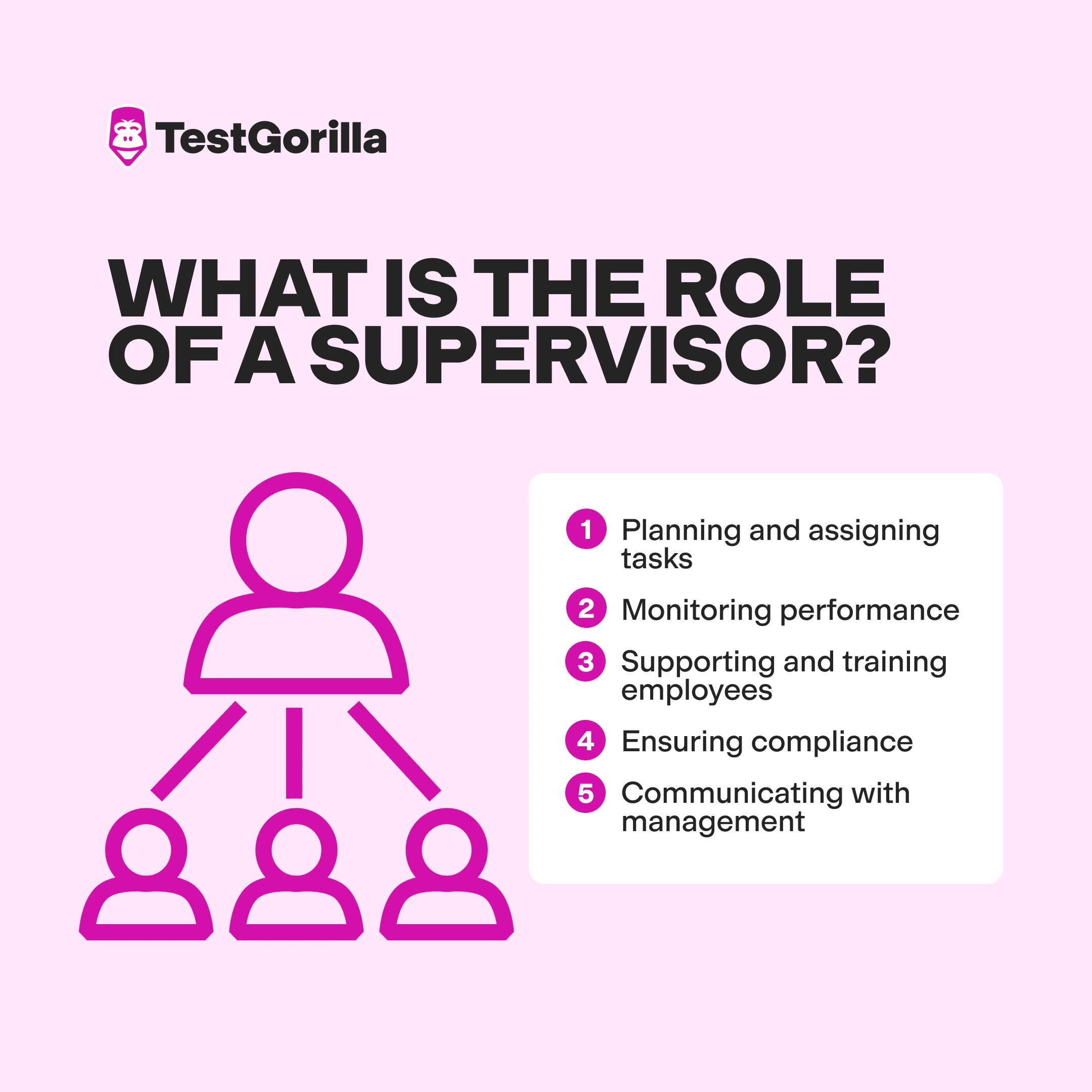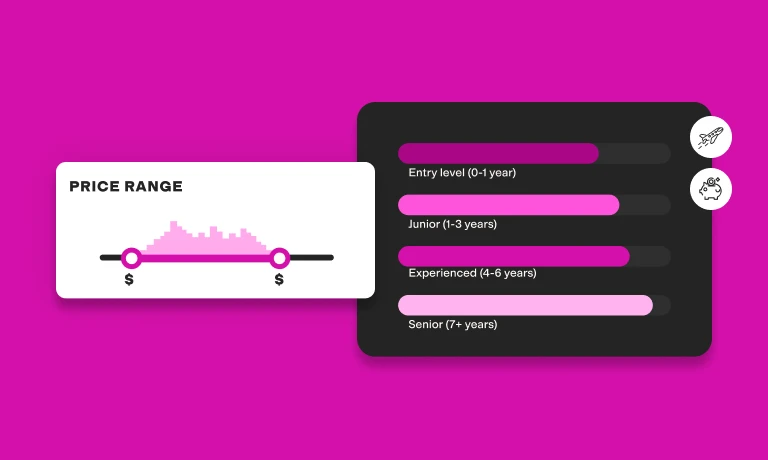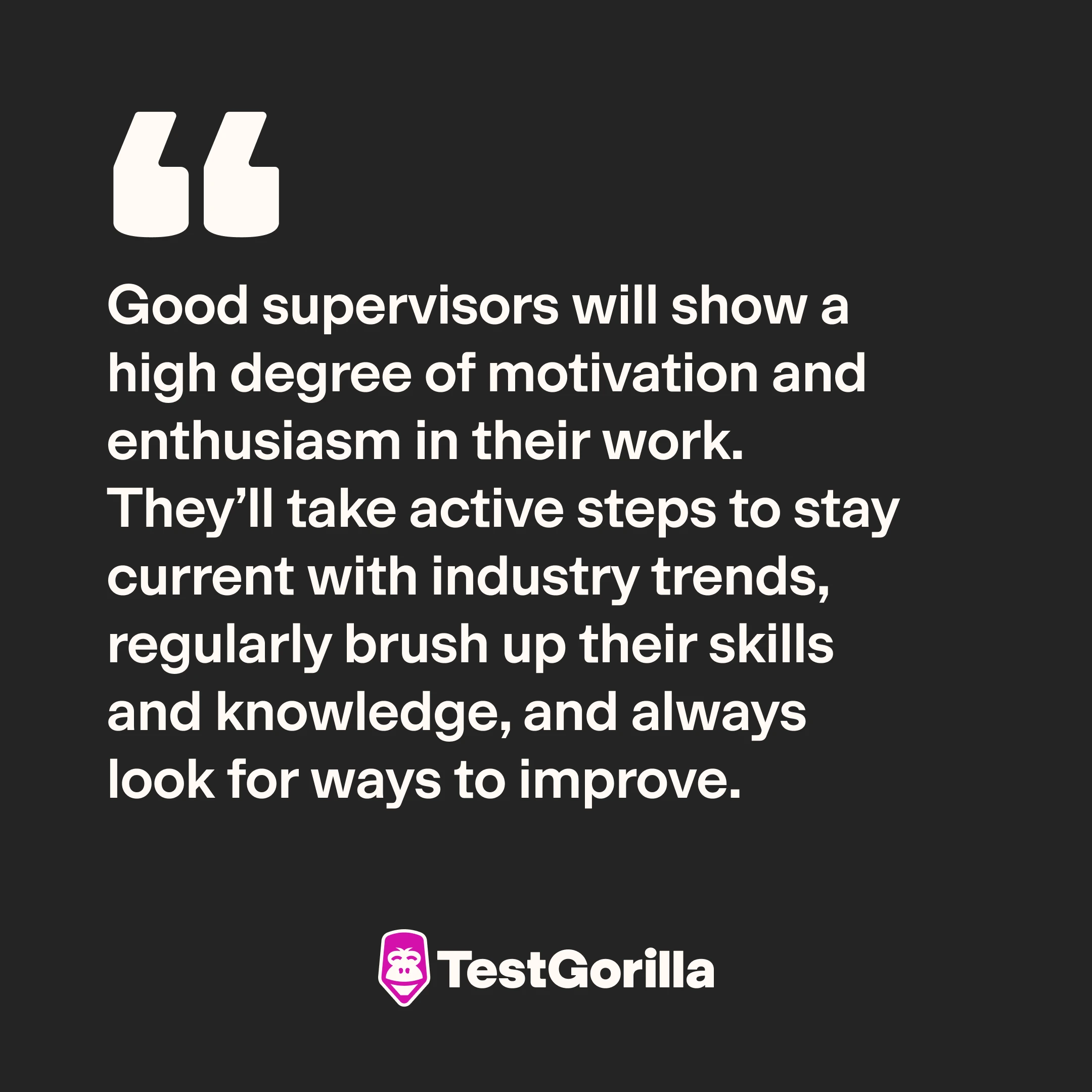20 interview questions for supervisors
It’s not easy to find a good supervisor. You need someone with the right mix of hard and soft skills, managerial experience, and personality traits – and not everyone is cut out for the job.
Hiring the wrong supervisor can disrupt work, damage team morale, and lead to high turnover rates. Unfortunately, this is more common than you think. But don’t worry, we’re here to help.
In this article, we share 20 of the best interview questions for supervisor roles. These questions will help you get to know the person behind the application, dive into their skills and experiences, and see if they have what it takes to be a great supervisor for your company.
Table of contents
- What is the role of a supervisor?
- Role-specific supervisor interview questions
- Top hard-skill interview questions for supervisors
- Top soft-skill interview questions for supervisors
- Questions on managing a team and general leadership
- Questions on creating and nurturing a positive work environment
- Situational interview questions for supervisors
- Self-development and personal motivation questions
- Land the best supervisors with skills-based interview questions and talent assessments
What is the role of a supervisor?
Supervisors are team captains. They ensure everyone knows what they’re doing, support their teams, and keep things running smoothly.
A supervisor’s daily duties typically include:
Planning and assigning tasks: Supervisors organize work schedules and delegate tasks to team members.
Monitoring performance: They keep an eye on how well everyone is doing, make sure the team is meeting goals, and provide feedback to their staff members.
Supporting and training employees: Good supervisors help employees with issues, provide training where needed, and support their team’s career development goals.
Ensuring compliance: They’re responsible for making sure everyone follows company policies and industry rules.
Communicating with management: Supervisors are the bridge between the big bosses and staff members, ensuring good communication and helping to create a positive work environment.
Looking to hire senior managers? Check out our blog with great interview questions for senior management.
Role-specific supervisor interview questions
These questions help assess candidates’ role-specific skills – those directly related to the job or industry they’ll work in. This could cover their knowledge about your company’s products or services, industry regulations, specialized processes, and so on.
Look for candidates who have a deep understanding of your sector and know the specific tasks their team will perform. This way, they’ll not only work to a high standard themselves but also be able to guide and support team members in achieving their goals.
Avoid progressing those who aren’t well-versed with your product or service or your industry, as they could underperform and struggle to guide their team effectively.
Here are some role-specific interview questions for your supervisor candidates.
1. Describe your experience with [specific product/service/process].
2. Have you ever had to implement a new industry regulation? How did you make sure your team followed the new practice?
3. Share an example of how you’ve improved a process or product in a previous role.
The best insights on HR and recruitment, delivered to your inbox.
Biweekly updates. No spam. Unsubscribe any time.
Top hard-skill interview questions for supervisors
Hard-skill questions check if a candidate has the technical abilities and knowledge required for their role.
These can include job- or company-specific hard skills – for instance, familiarity with relevant technologies or the ability to perform specialized tasks. They can also look at hard supervisory skills, such as project management, budgeting, quality control, and more.
Good candidates will have strong technical skills and prove that they can apply these skills in their jobs and support their teams in their day-to-day work. Consider rejecting candidates who lack either the specific technical expertise or general supervisory skills that are key to success in the role.
These questions can help you get a solid sense of your candidates’ hard skills.
4. Can you walk me through a project you managed from start to finish? What methodologies did you use for managing the project and why?
5. What steps do you take to manage your team or project’s budgets?
6. Are you familiar with [relevant tools/software]. How have you previously used this software?
7. How do you ensure your team’s work is up to par and meets the company’s quality standards?
Top soft-skill interview questions for supervisors
This type of question judges your supervisor candidates on the soft skills needed for their roles. For example, you could ask customer communication-related questions to test call center supervisors or attention-to-detail questions to test data entry supervisors.
You’ll also want to ask questions targeting general soft skills you’ll find in any great supervisor – whether they’re warehouse managers or work in retail. For instance, communication skills, emotional intelligence, and adaptability are key to being a good manager.
Prioritize candidates who are strong communicators, show empathy, and are good at building relationships with their teams. Drop candidates who can’t confidently speak to these qualities through their experiences or fail to demonstrate the desired soft skills during the interview process – for example, if you see them struggling with their interpersonal skills or active listening.
Ask applicants the below interview questions to learn more about their soft skills.
8. Describe a situation where you had to adapt quickly to a change. How did you handle it?
9. How do you build strong relationships with your team members?
10. Can you provide an example of how you’ve shown empathy in a professional setting?
Wondering how to assess your warehouse supervisor candidates? Check out our Warehouse Supervisor test and recommended interview questions for warehouse supervisors.
Questions on managing a team and general leadership
Leadership and management questions assess how your candidates guide and motivate their teams, make strategic decisions, and provide support and mentorship.
Look for supervisors who are effective managers, can make tough decisions, help resolve their workers’ problems, and mentor others to achieve their full potential. Reject candidates who lack these leadership qualities or come across as non-inspiring in their interviews.
Here are some great management interview questions to dive into your supervisor’s management and leadership abilities.
11. Can you describe a difficult decision you made as a supervisor?
12. What strategies do you use to mentor and develop your team members?
13. How do you handle underperforming team members?
Questions on creating and nurturing a positive work environment
These questions evaluate if applicants can foster a supportive and inclusive work environment for their team members. This includes resolving conflicts, taking active steps to create a positive culture, and being considerate of team members’ needs and well-being.
The best candidates will be good mediators, show genuine care and appreciation for their employees, and have a clear path to building a strong, diverse, and inclusive team. Avoid progressing candidates who show signs of being confrontational, unsupportive, or harsh in their leadership style.
Ask potential supervisors the questions below to assess these qualities.
14. Can you describe a time when you resolved a conflict within your team?
15. What steps do you take to ensure your team feels supported and valued?
Situational interview questions for supervisors
Situational interview questions help examine an applicant’s ability to effectively handle different scenarios. This includes how they tackle unexpected challenges, lead through change, and make the right calls regardless of the situation.
Progress supervisor candidates who show that they can remain calm under pressure, make quick but sound decisions, and adapt to changing circumstances with ease. Conversely, consider dropping those whose answers suggest they have a tendency to panic, don’t work well under pressure, or are rigid in their work and management approach.
This set of questions can help you determine how your candidates will behave in different situations:
16. Describe a time you had to manage a crisis. How did you handle it?
17. How do you make decisions when faced with limited information?
18. Can you provide an example of how you’ve led a team through a significant change?
Self-development and personal motivation questions
Lastly, these questions look at your supervisors’ commitment to continuous learning, improving operations, and growing with your company.
Good supervisors will show a high degree of motivation and enthusiasm in their work. They’ll take active steps to stay current with industry trends, regularly brush up their skills and knowledge, and always look for ways to improve.
On the other hand, a poor candidate will show little interest in growth and improvement, lack drive, and will likely not set personal and professional goals for themselves.
Here are some interview questions to see how your candidates measure up to your expectations.
19. What are your personal and professional development goals for the next year?
20. How do you stay updated with industry trends and advancements?
Land the best supervisors with skills-based interview questions and talent assessments
A great supervisor can boost team morale, drive productivity, and lead their team like a well-oiled machine. But finding someone fit for the task is no easy feat. Luckily, a well-rounded supervisor interview can bring you one step closer to landing the ideal candidate.
With the right questions, you can dig deeper into candidates' role-specific expertise, hard and soft skills, and leadership capabilities. You can also ask situational questions to learn more about how they’d respond to various situations and predict their future behaviors as managers of your company.
That said, relying solely on interviews doesn’t fully mitigate the risks of mis-hiring – largely because interviews are still prone to biases. Consider screening applicants with TestGorilla’s talent assessments to vet their skills for the job before putting them through the interview process.
Check out our test library, sign up for a free account, or book a live demo with a member of our team today!
You've scrolled this far
Why not try TestGorilla for free, and see what happens when you put skills first.




















